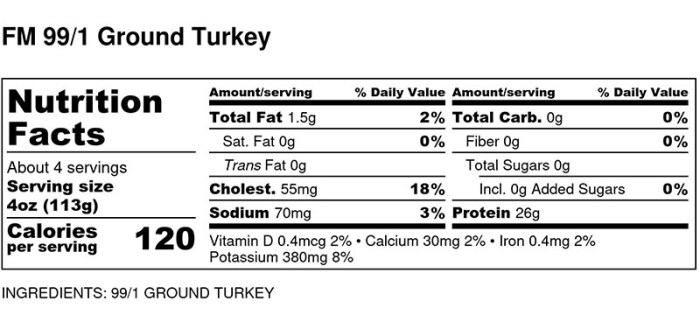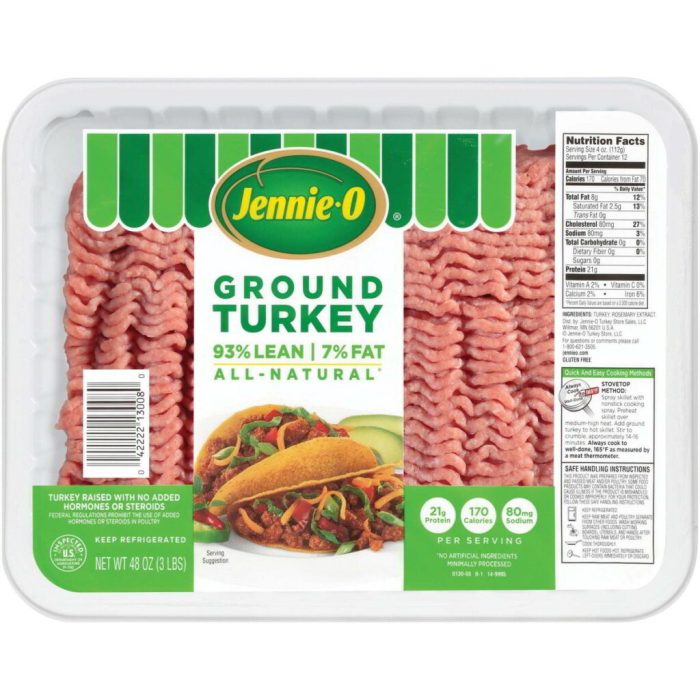Nutritional Composition of 1 lb Ground Turkey

1 lb ground turkey nutrition facts – One pound of ground turkey offers a substantial source of protein and various essential nutrients. Its nutritional profile, however, varies depending on the leanness percentage. Understanding this composition is crucial for individuals managing their dietary intake and aiming for specific health goals. This section details the macronutrient breakdown and essential micronutrient content of 1 lb of ground turkey, highlighting differences between lean and extra-lean varieties.
Macronutrient Breakdown of 1 lb Ground Turkey, 1 lb ground turkey nutrition facts
A pound of 93% lean ground turkey (approximately 454 grams) contains roughly 270 grams of protein, 80 grams of fat, and negligible carbohydrates. These values can fluctuate slightly depending on the specific brand and preparation method. Based on a 2000-calorie diet, this translates to approximately 135% of the recommended daily protein intake (RDI), a significant portion of the daily fat allowance (the exact percentage depends on individual fat recommendations), and a minimal contribution to carbohydrate intake.
It’s important to note that the fat content significantly influences the total calorie count.
Vitamins and Minerals in 1 lb Ground Turkey
The following table provides an estimate of the vitamin and mineral content in 1 lb of 93% lean ground turkey. Values may vary based on the specific brand and processing methods. These values represent approximate percentages of the recommended daily intake (RDI) for a 2000-calorie diet. It is crucial to consult nutrition labels for the most accurate information.
| Nutrient | Amount (approx.) | % Daily Value (approx.) | Important Note |
|---|---|---|---|
| Protein | ~108g | ~216% | High protein content supports muscle growth and repair. |
| Vitamin B12 | ~70µg | ~280% | Essential for nerve function and red blood cell formation. |
| Niacin | ~30mg | ~150% | Contributes to energy metabolism and DNA repair. |
| Selenium | ~50µg | ~71% | Acts as an antioxidant and supports thyroid function. |
| Iron | ~5mg | ~28% | Essential for oxygen transport and energy production. |
Nutritional Comparison: Lean vs. Extra-Lean Ground Turkey
The differences in nutritional content between lean and extra-lean ground turkey primarily lie in their fat and calorie content. Choosing between the two depends on individual dietary needs and preferences.
- Fat Content: Extra-lean ground turkey (typically 96% lean or higher) contains significantly less fat than lean ground turkey (typically 93% lean). This results in a lower calorie count per serving.
- Protein Content: While both offer high protein, the difference in protein content between lean and extra-lean is minimal.
- Calorie Count: Extra-lean ground turkey generally has fewer calories due to the reduced fat content.
- Flavor and Texture: Extra-lean ground turkey might be slightly drier and less flavorful than lean ground turkey. Proper cooking techniques can mitigate this.
Culinary Applications and Recipes

Ground turkey’s versatility makes it a staple in diverse cuisines. Its lean nature allows for healthy and flavorful dishes, suitable for various dietary preferences. This section explores culinary applications and provides examples of recipes utilizing one pound of ground turkey. Proper preparation techniques are also discussed to maximize nutritional value and minimize added fats and sodium.
Ground turkey can be used as a substitute for ground beef in many recipes, offering a leaner protein source. Its mild flavor allows it to readily absorb the flavors of accompanying ingredients, making it adaptable to a wide range of culinary styles.
Five Diverse Ground Turkey Recipes
The following recipes demonstrate the versatility of 1 lb of ground turkey, showcasing its adaptability across various cuisines and cooking methods.
- Turkey Meatloaf: Combine 1 lb ground turkey with breadcrumbs, egg, chopped onion, garlic, and your favorite seasonings. Shape into a loaf and bake until cooked through. This classic comfort food provides a leaner alternative to traditional beef meatloaf.
- Turkey Chili: Brown the ground turkey with onions and peppers. Add diced tomatoes, kidney beans, chili powder, cumin, and other desired spices. Simmer until thickened for a hearty and flavorful chili.
- Turkey Lettuce Wraps: Sauté ground turkey with water chestnuts, soy sauce, ginger, and garlic. Serve in crisp lettuce cups for a low-carb, refreshing meal.
- Turkey and Vegetable Skewers: Combine ground turkey with chopped vegetables like zucchini, bell peppers, and onions. Form into small patties and thread onto skewers. Grill or bake until cooked through for a healthy and visually appealing dish.
- Turkey Shepherd’s Pie: Brown the ground turkey with carrots, peas, and corn. Top with mashed sweet potatoes or cauliflower mash for a healthier twist on this classic comfort food.
Healthy Preparation of Ground Turkey
Minimizing added fats and sodium during ground turkey preparation is crucial for maintaining its nutritional benefits. The following techniques promote healthy cooking.
Understanding the nutritional profile of 1 lb of ground turkey, a lean protein source, is crucial for balanced eating. However, a balanced diet also considers the impact of less healthy choices; comparing the lean protein content of the turkey to the high sodium and fat content found in a serving, as detailed in the nutrition facts for salt and vinegar chips , highlights the importance of mindful portion control.
Ultimately, responsible food choices revolve around understanding the nutritional contrast between healthy options like ground turkey and less healthy snacks.
To minimize added fats, avoid adding excessive oil when browning the turkey. The natural fats in the ground turkey will render out during cooking. Lean ground turkey (93% lean or higher) is recommended for optimal results. Instead of relying on salt for flavor, use herbs, spices, and citrus juices to enhance the taste. Consider using low-sodium broths or stocks when preparing stews or sauces.
Grilling, baking, or stir-frying are healthier cooking methods compared to deep frying.
Storing and Handling Ground Turkey
Proper storage and handling are essential to prevent bacterial contamination and maintain the quality and freshness of ground turkey.
- Always refrigerate ground turkey promptly after purchase, ideally within two hours of purchase.
- Store ground turkey in its original packaging or transfer it to an airtight container to prevent freezer burn.
- Ground turkey should be cooked to an internal temperature of 165°F (74°C) to ensure it is safe to eat.
- Avoid cross-contamination by using separate cutting boards and utensils for raw ground turkey and other foods.
- Do not refreeze thawed ground turkey.
Impact of Preparation Methods: 1 Lb Ground Turkey Nutrition Facts
The nutritional content of ground turkey can be significantly altered by various cooking methods and the addition of ingredients. Understanding these changes is crucial for maintaining the health benefits associated with consuming this lean protein source. Factors such as fat loss during cooking, nutrient leaching, and the caloric contribution of added ingredients all play a role in the final nutritional profile of the dish.Different cooking methods affect the nutritional content of ground turkey in several ways.
Fat content, for example, is influenced by the method employed.
Effect of Cooking Methods on Ground Turkey Nutrition
Cooking methods impact the fat content and overall nutrient retention of ground turkey. Grilling, for instance, allows excess fat to drip away, resulting in a leaner product compared to pan-frying or baking. Stir-frying, while quick, may lead to some nutrient loss if the cooking time is excessive. Baking generally retains more moisture and nutrients than grilling, but can result in a slightly higher fat content if not properly drained.
The best method depends on individual dietary preferences and goals.
Impact of Added Ingredients
The addition of oils, spices, sauces, and other ingredients substantially impacts the overall nutritional profile of ground turkey dishes. Adding oils increases the fat content and caloric density. The type of oil used also matters; olive oil offers heart-healthy monounsaturated fats, while others may contain more saturated fats. Sauces, especially creamy ones, often contribute significantly to sodium, sugar, and fat content.
Spices, while generally healthy, can sometimes contain added sodium. Therefore, mindful selection of ingredients is essential for maintaining a balanced nutritional profile.
Nutritional Comparison of Different Ground Turkey Fat Percentages
The fat percentage of ground turkey significantly influences its nutritional value. Lean ground turkey (typically 93% lean/7% fat) offers a lower calorie and fat content compared to extra-lean (99% lean/1% fat) or ground turkey with higher fat percentages.
| Ground Turkey Type | Calories (per 4 oz serving) | Total Fat (g per 4 oz serving) | Protein (g per 4 oz serving) |
|---|---|---|---|
| Extra Lean (99% lean) | 120-130 | 1-2 | 25-27 |
| Lean (93% lean) | 150-160 | 4-6 | 25-27 |
| Regular (80% lean) | 180-200 | 10-15 | 25-27 |
Note: Nutritional values are approximate and can vary depending on the brand and processing methods. These values represent a typical range.
Clarifying Questions
What is the difference in fat content between lean and extra-lean ground turkey?
Lean ground turkey generally contains around 90% lean meat and 10% fat, while extra-lean boasts a higher lean percentage (93-96%), resulting in fewer calories and fat grams per serving.
Can I freeze ground turkey? If so, for how long?
Yes, ground turkey can be frozen for 3-4 months in an airtight container or freezer bag. Ensure it’s properly wrapped to prevent freezer burn and maintain quality.
How does the cooking method affect the sodium content?
Adding high-sodium sauces or marinades during cooking significantly increases the sodium content of ground turkey. Using low-sodium options and herbs/spices is recommended.
